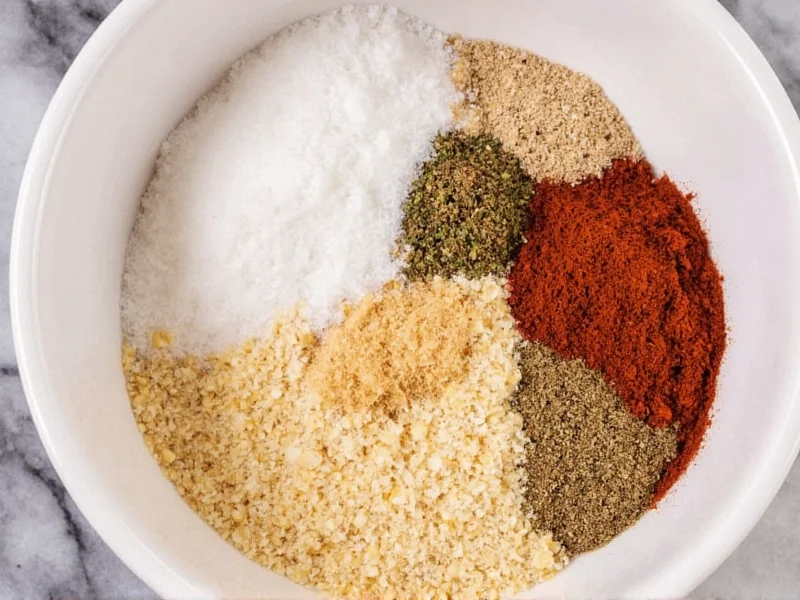The essential spices for traditional corned beef include mustard seeds, coriander seeds, black peppercorns, allspice berries, and cloves. Most commercial corned beef spice packets also contain bay leaves and sometimes a small amount of red pepper flakes for subtle heat. For homemade blends, a standard ratio is 2 tablespoons mustard seeds, 1 tablespoon coriander seeds, 1 tablespoon black peppercorns, 1 teaspoon allspice berries, and 6-8 whole cloves per 3-4 pound brisket.
Understanding Corned Beef Spice Blends
When preparing corned beef, the spice blend plays a crucial role in developing the distinctive flavor profile that makes this dish special. While many store-bought corned beef kits come with pre-packaged spice packets, understanding the components allows you to customize your seasoning for superior results.
Core Spices in Traditional Corned Beef Rubs
The foundation of any authentic corned beef seasoning consists of whole spices rather than pre-ground versions. Using whole spices preserves their essential oils and provides a more complex flavor profile during the long cooking process.
| Spice | Flavor Contribution | Traditional Amount (per 3-4 lb brisket) |
|---|---|---|
| Mustard seeds | Earthy, slightly pungent base note | 2 tablespoons |
| Coriander seeds | Citrusy, floral undertones | 1 tablespoon |
| Black peppercorns | Sharp heat and complexity | 1 tablespoon |
| Allspice berries | Warm notes of clove, cinnamon, nutmeg | 1 teaspoon |
| Cloves | Intense aromatic sweetness | 6-8 whole |
| Bay leaves | Subtle herbal background | 2 leaves |
Why Whole Spices Work Best for Corned Beef
Professional chefs and experienced home cooks prefer whole spices for corned beef because they release flavors gradually during the extended cooking process. Ground spices would become bitter and overpowering. The slow simmer allows the essential oils to infuse the meat without dominating the final flavor profile.
When creating your homemade corned beef seasoning recipe, toast the whole spices in a dry skillet for 2-3 minutes until fragrant before using. This simple step enhances the aromatic compounds and creates a more complex flavor base for your corned beef brisket.
Regional Variations in Corned Beef Seasoning
While the basic spice blend remains consistent, regional preferences influence corned beef seasoning:
- New England style: Often includes a touch of brown sugar for subtle sweetness
- Irish tradition: Typically simpler with just mustard, pepper, and coriander
- Spicy variation: Adds 1-2 dried red chilies or 1/4 teaspoon crushed red pepper
- Sweet-spice version: Incorporates 1-2 cinnamon sticks for additional warmth
Understanding these regional differences helps when searching for the best spices for corned beef brisket that match your personal taste preferences.
Creating Your Own Corned Beef Spice Blend
Making your own spice mix gives you complete control over flavor intensity and quality. For a basic traditional corned beef spice blend ingredients recipe:
- Combine 2 tablespoons yellow mustard seeds, 1 tablespoon coriander seeds, 1 tablespoon black peppercorns, 1 teaspoon allspice berries, and 8 whole cloves
- Add 2 bay leaves (remove before serving)
- Optional: 1/4 teaspoon crushed red pepper for heat
- Store in an airtight container away from light
This blend will keep for up to 6 months while maintaining optimal flavor. When using your homemade corned beef seasoning recipe, place the spices in a cheesecloth pouch or directly in the cooking liquid.
Common Mistakes to Avoid
Even experienced cooks make these errors when working with corned beef spices:
- Using pre-ground spices instead of whole (results in bitter, one-dimensional flavor)
- Overloading on cloves (they dominate quickly - 6-8 is sufficient for 4 pounds of meat)
- Adding sugar without balancing other spices (creates cloying sweetness)
- Not toasting spices first (misses opportunity for deeper flavor development)
- Using old, stale spices (check freshness before starting)
Substituting When Ingredients Are Unavailable
If you can't find specific spices for your corned beef spice packet, consider these substitutions:
- Coriander: Substitute with a pinch of lemon zest added near the end of cooking
- Mustard seeds: Use 1 teaspoon prepared mustard added during the last hour of cooking
- Allspice: Combine equal parts ground cloves, cinnamon, and nutmeg (use sparingly)
- Black peppercorns: Freshly ground white pepper works in a pinch
Remember that substitutions change the flavor profile, so adjust quantities carefully when creating your substitutes for corned beef seasoning.
Perfecting Your Corned Beef Spice Ratio
The ideal spice-to-meat ratio ensures balanced flavor without overwhelming the beef. For every pound of corned beef, use approximately 1½ teaspoons of total spice blend. This corned beef spice mix proportions guideline prevents under-seasoning or overpowering your dish.
When brining your own corned beef (rather than using pre-cured meat), increase the spice quantity by 25% to compensate for the longer curing process. The spices need to penetrate the meat during curing, not just flavor the cooking liquid.











 浙公网安备
33010002000092号
浙公网安备
33010002000092号 浙B2-20120091-4
浙B2-20120091-4